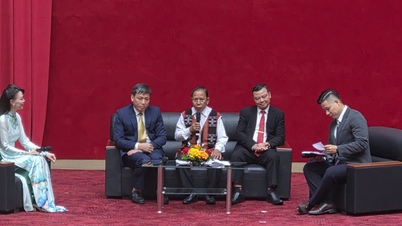China launches VISA K to attract talent
Recently, the US government has decided to increase the fee for H-1B visa, a very important visa for highly skilled workers who want to work in the US. The new fee has increased to 100 thousand USD, becoming a big barrier that not all companies and workers can afford. The door to the US market seems to have narrowed a bit - even for talented and qualified people.
But just two days later, China - the world's second largest economy - announced that it would introduce a new visa - VISA K - for young professionals in the fields of science and technology. This visa is open to welcome talents to study and work in China. Will this new door welcome workers looking for opportunities? And will it be enough to make the flow of brainpower to China when brainpower and intelligence create economic strength?
The K visa will be added to the existing 12 types of ordinary visas, the Chinese Foreign Ministry said, adding that the policy is aimed at promoting international exchanges and cooperation between Chinese and foreign science and technology circles.
"In order to promote international exchanges and cooperation between Chinese and foreign science and technology experts, China has decided to add the K visa to the general visa category for young professionals in this field. Detailed information on the procedures will be announced soon by Chinese embassies and consulates abroad," said Guo Jiakun, spokesman for the Chinese Ministry of Foreign Affairs.
According to a decision signed by Prime Minister Li Qiang in August, the K visa will officially take effect from October 1. Compared to other types of visas, the K visa allows more entries, longer validity and stay, and also relaxes the requirement for invitation letters from businesses sponsoring workers.
With the new policy, K visa holders can participate in exchange activities in education, culture, science and technology, as well as start-ups and businesses. This is considered a step to attract more young, high-quality human resources to serve development goals.
China expands visa policy
It can be seen that the billion-people economy is striving to become an attractive destination, welcoming the flow of brainpower, creating a foundation for economic and scientific and technological development. China's next step is to build an environment that encourages foreign experts to enter and stay long-term.
In recent years, the country has been continuously loosening its visa policy to facilitate travel and business. Last December, the National Immigration Agency improved its transit visa exemption policy, extending the stay period to 10 days and expanding the scope of application to 24 provinces and cities.
Middle East strives to attract foreign experts
Not only China, but also the Middle East is emerging as a new fertile land for talented professionals. Gulf countries such as Saudi Arabia, the United Arab Emirates, Qatar or Kuwait are competing very hard to attract international talent and experts and in fact, many global talents have come to them.
These countries have implemented many preferential policies. The most prominent is the "Golden Visa" program of the United Arab Emirates, for example. It focuses on attracting many candidates from fields such as artificial intelligence, Internet of Things, cloud computing or experts in the fields of health, education, environment, transport development, etc. These are the strategic areas that the United Arab Emirates needs to focus on.
Saudi Arabia has a similar program, which can be called a "Green Card" to attract international talent. Along with long-term visa policies and stable residency, there are many attractive incentives on taxes, housing support, health care, welfare for family members, etc.
There are many strategic reasons why Gulf countries are promoting the attraction of international experts. For example: diversifying the economy when foreign experts help bring in new skills, technology, modern management to develop industries other than oil and gas. Supplementing high-quality human resources in some key areas that the Gulf is not strong in.
In addition, there are also goals: Strengthening international competitiveness, attracting investment and Improving governance and international standards. These policies have clearly demonstrated the long-term vision of the Gulf countries in building a knowledge-based economy, attracting global talent and creating stable living conditions for the multidisciplinary professional community.
International students face many choices
Are we about to see a shift in the global brainpower flow? When the US market is no longer the perfect destination? Perhaps we need to look deeper to answer this question. That is to look at the higher education market and post-graduate education.
Until now, the United States has always been the number one destination for international students. But with tuition fees still high, scholarship programs under pressure, and political turmoil, international students are starting to consider other options from Germany, Canada to China - in the global race for talent.
For decades, the United States has been a top destination for international students. In 2023 alone, while the proportion of foreign students at American universities only accounted for about 6% of total enrollment, the absolute number exceeded 1 million. India led with more than 300,000 students, followed by China with more than 270,000, along with South Korea and Canada.
Higher education has become one of America’s biggest exports economically. But a rapidly changing political landscape is eroding that traditional appeal. Even prestigious student exchange programs—long seen as symbols of academic exchange—are under pressure, and scholarships are shrinking.
Vince, an international student, said: "I still think the US is one of the best places to pursue higher education, but recent developments have caused some concerns for international students. And in times like these, that can cause negative reactions for people like us. However, we are trying to stay positive and adapt to the current situation, seeing what we can do in the current context."
Meanwhile, Germany has emerged as an alternative bright spot. "International students have chosen Germany as one of their favorite destinations for many years now. The quality of education is good, while tuition fees are almost completely free," said Wido Geis Thone, head of the German Economic Institute in Cologne.
In 2023, international students will account for 16% of total university enrolments in Germany, equivalent to nearly half a million people. The attraction comes from high-quality training and open immigration policies. The countries sending the most students to Germany are India with nearly 50,000 people, China with more than 42,000, followed by Türkiye, Syria and Austria.
Germany’s big differentiator lies in its ability to retain talent. About 45% of international students remain working in Germany after 10 years, the highest in the OECD and even surpassing Canada. This figure reflects the urgent need of the German economy, by 2030, the country will lack about 2 million highly skilled workers. In this context, universities are not only a place to study but also a gateway to the labor market.
However, the labor market, or in other words, the output for students in Germany and Europe, is considered to be less attractive than that of the US.
"The US is known for its flexible labour market, which easily absorbs talent. In contrast, Europe has long been seen as a rigid and fragmented market. However, reforms in recent years have helped Germany and other EU countries gradually catch up, especially in areas of advanced research that are difficult to access in the US," said Andreas Schleicher, Director of Education and Skills, OECD.
As barriers in the US become more apparent, the choice of studying abroad becomes a matter of careful consideration. On the one hand, the US still holds a great advantage in terms of brand and career opportunities after graduation. But on the other hand, the expansion of opportunities from Germany, Canada and even China is attracting students who want not only to study but also to stay long-term.
It can be seen that from the US to Europe, China or even the Middle East, each country is opening - or closing - its own doors to talent. Which direction the brainpower will choose depends on the opportunities, living conditions and long-term development strategy of each economy.
Source: https://vtv.vn/chat-xam-toan-cau-dich-chuyen-dau-se-thanh-diem-den-moi-100251003090138445.htm




































![[Photo] General Secretary To Lam and National Assembly Chairman Tran Thanh Man attend the 80th Anniversary of the Traditional Day of the Vietnamese Inspection Sector](https://vphoto.vietnam.vn/thumb/1200x675/vietnam/resource/IMAGE/2025/11/17/1763356362984_a2-bnd-7940-3561-jpg.webp)












































































Comment (0)